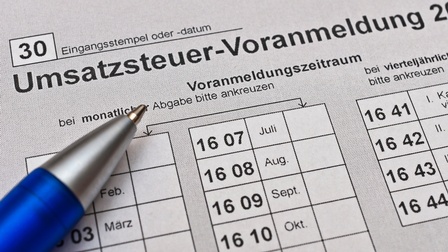
Sales tax and input tax – an introduction
Umsatzsteuer und Vorsteuer - Eine Einführung
Lesedauer: 5 Minuten
What is subject to sales tax?
The following transactions are subject to sales tax under the Sales Tax Act:
- Deliveries and services provided by an entrepreneur in Austria for payment within the scope of his company (see example)
- Own consumption (e.g. the entrepreneur takes out goods for his own needs)
- The import of goods from third countries (e.g. the entrepreneur imports textiles from Asia, whereby import sales tax is due)
- The import of goods from EU countries (e.g. the entrepreneur imports trading goods from Germany, whereby acquisition tax is due)
Example:
Textile wholesaler A. sells goods amounting to € 2,000 to textile retailer B. He must invoice sales tax at 20 %; he therefore invoices € 2,400; he must pay the € 400 as a sales tax liability to the fiscal authorities.
The sales tax is retained at every economic level (e.g. producer, manufacturer, wholesaler, retailer); on account of the input tax deduction, however, it does not constitute a cost factor within the chain of entrepreneurs, instead it is treated as a “transit item.”
Input tax deduction
Input taxes are the sales tax amounts that are shown separately by another entrepreneur on an invoice.
Example:
Textile retailer B. can get back the 20 % sales tax (€400) invoiced to him by A. from the fiscal authorities as input tax.
Practical implementation
First, the entrepreneur calculates his entire sales tax on the deliveries and services he has rendered to his customers within a certain period of time (as a rule, one calendar month). The input tax accrued within this period is then deducted from this amount. The result is either the sales tax to be paid or – with an input tax surplus – a credit balance.
Prerequisites for the deduction of input tax
- The deliveries or services on which the invoice is based must have been carried out for the company. This is the case in the event of an entrepreneurial usage of at least 10 %. With regard to possible private use, taxable private consumption accrues to a corresponding extent.
- The delivery or other service must have already been carried out.
- The invoice must have been sent (with regard to ACTUAL taxation, payment of the invoice is a prerequisite for the deduction of input tax!).
- The invoice must comply with all statutory provisions. Should any legally required feature be missing or contain errors, this will result in the loss of the entitlement to deduct input tax.
- The service provider’s VAT ID number must be valid; a level 2 check must be carried out via FinanzOnline for validity.
- The procured deliveries and services must be used for the execution of taxable turnover or turnover exempt from sales tax with credit (e.g. for exports or intra-community deliveries, cross-border forwarding of goods).
- Incorrectly shown sales tax does not give rise to the entitlement to deduct input tax (e.g. VAT declared although the tax liability would have been transferred)
When does a sales tax liability accrue?
Entrepreneurs who do not exceed the accounting threshold pay taxes in principle according to their received payments. This means that the sales tax liability accrues upon the expiration of the month in which the invoice was received.
This so-called ACTUAL taxation has the advantage that the sales tax for accounts receivable does not have to be paid.
It is imperative that entrepreneurs who are subject to mandatory accounting pay taxes according to the agreed payment amounts. In this case, the sales tax liability accrues upon expiration of the calendar month in which the delivery or other service has been executed; the date of payment receipt is irrelevant here (exception: prepayments).
Attention:
In the event that the invoice is not paid in the same month, but at a later time, the tax liability accrues upon expiration of the month following the delivery or service. Regarding the so-called TARGET taxation, the sales tax on accounts receivable must be paid.
Transfer of tax liability
In certain cases, it is not the provider of a service who owes the tax; instead, the tax liability is transferred to the recipient of the service. This applies especially to construction services, in the area of secondary raw materials, the supply of mobile telephones, integrated circuits, video games, laptops and certain metal products and the supply of laptops and the like. The tax liability is also transferred when the service provider is a foreign entrepreneur who does not have a plant in Austria. Refer to the respective information leaflets for more detail.
Tax rates
- Regular tax rate 20 %
- Reduced tax rates 0 %, 10% and 13 %
The reduced tax rates apply to foodstuffs, books, passenger transportation, lodging, among other things. Please refer to the leaflet “The main cases of application for reduced tax rates” for more information.
Tax exemptions
A distinction is made between:
- Exemptions with credit for which the turnovers are exempt from the sales tax, but for which the right to deduct input tax remains. The most important case is exports to third countries.
- Exemptions without credit for which sales tax is not invoiced, and the corresponding input tax cannot be claimed. Examples: Small business owners, insurance companies, insurance agents, rentals for business premises etc.